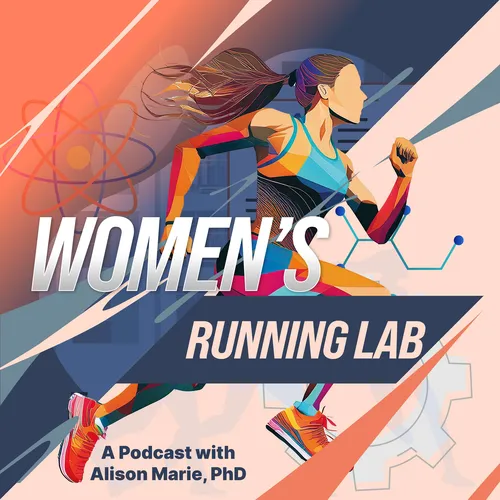
The Women's Running Lab
Welcome to the Women’s Running Lab Podcast. I’m your host, Alison Marie teacher, coach and self proclaimed running nerd. Here you’ll gain a deeper understanding of the physics and physiology of running and what that means for your body and your training. We are going to get nerdy, but we are also going to break it down into the simplest form of what actually works AND in a way that you can consistently do it.
- Update frequency
- every 6 days
- Average duration
- 26 minutes
- Episodes
- 50
- Years Active
- 2024 - 2025

E29 - The Journey of Maturing as a Runner: Lessons Learned Over Time
In this episode, Alison reflects on her personal growth as a runner over the years. She compares her early running experiences to her current approach, focusing on aspects like pacing, breathing, fue…

E28 - How to Build Effective Training Timelines for Endurance Races
In this episode, Alison shares her recent experience racing a half marathon and discusses the importance of setting realistic training goals. She reflects on how she trained for this race, including …

E27 - Strength and Endurance Combined: Balancing Running and Lifting for Optimal Results
In this episode, Alison discusses the benefits of strength training for runners. Strength training, when done correctly, can enhance running economy and improve the body's ability to manage ground re…

E26 - Why Runners Get Upper Back Pain – and the Best Ways to Prevent It
In this episode, Alison discusses her experience with neck and back pain during long runs and speed work while training for a half marathon. She explains how poor posture, like hunching over and forw…

E25 - How to Improve Running Economy: Springy Strides and Effective Techniques
In this episode, Alison discusses strategies to improve running efficiency by developing a "springy" stride. She highlights research showing how simple exercises like jump roping or pogos can improve…

E24 - The Best Leg Workouts for Runners: Targeting Strength and Range of Motion
In this episode, Alison discusses the importance of strength training for runners, focusing on the lower body movements like hinging, squatting, and lunging. She emphasizes that running is a three-di…

E23 - How to Activate Glutes for Runners: Master Lengthening and Strengthen Your Stride
In this episode, Alison discusses the importance of glute activation for runners, emphasizing the need for proper glute engagement through lengthening, not just squeezing or external rotation. She cr…

E22 - Solving IT Band Pain: The Role of Glute Strength and Efficient Loading in Running
In this episode, Alison discusses IT band issues in runners, emphasizing that these problems are often caused by strength and stability imbalances rather than tightness in the IT band itself. She exp…

E21 - Fueling for Success: The Best Fuel for Running and How It Impacts Performance
In this episode, Alison explains that impatience and under-fueling are two key predictors of injury that she frequently observes in runners. She emphasizes the importance of being patient in the trai…

E20 - The Power of Strength and Proper Alignment to Release Chronically Tight Muscles
In this episode, Alison discusses the importance of addressing muscle tightness not just through stretching or foam rolling, but by improving strength, stability, and position. She explains that tigh…

E19 - Rib Mobility Exercises: The Key to Improved Core Strength, Breathing, and Running Efficiency
In this episode, host Alison explores the role of rib mobility in enhancing running performance by improving breathing efficiency, core engagement, and rotation. Proper rib movement optimizes diaphra…

E18 - Strength Training and Running: Unlocking the Secrets to Faster, Stronger Runs
In this episode, Alison discusses the importance of rest during strength training for runners, emphasizing that strength training should focus on force production and proper recovery rather than spee…

E17 - Strength Training for Hill Running: Building Power and Confidence
In this episode, host Alison Marie discusses the biomechanics of uphill and downhill running. She highlights the physical challenges of uphill running, such as increased demand on the hip flexors and…

E16 - Beyond Running: Advocating for Women's Autonomy and Rejecting Societal Pressures
In this episode, Alison discusses the importance of body autonomy and how it relates to both running and broader societal issues. She shares her perspective on coaching, emphasizing the value of unde…

E15 - Master the Best Running Warm-ups: Beyond Dynamic Stretching
In this episode, Alison discusses the importance of an effective warm-up, emphasizing dynamic movements that increase blood flow, improve neuromuscular coordination, and enhance joint range of motion…

E14 - How to Strengthen Hips for Running: Dynamic Drills for Better Performance
In this episode Alison dives into the critical role of hip strength in running, challenging the common belief that tight hips need more stretching rather than strengthening. She explains how efficien…

E13 - Finding a Good Cadence for Running: Breaking Down the Numbers and Myths
In this episode, host Alison Marie discusses the concept of cadence in running and its impact on performance and injury risk. She explains that while the commonly recommended 180 steps per minute wor…

E12 - How to Strengthen Pelvic Floor for Running: 7 Fundamentals for a Responsive Pelvic Floor
In this episode Alison explores the importance of pelvic floor function for runners and outlines seven core principles from her Pelvic Floor Fundamentals course. She begins by sharing a personal stor…

E11 - Systematically Build Up Your Zone 2 Without Feeling Like You are Banging Your Head Against a Wall
In this episode, Alison explores the concept of Zone 2 training, emphasizing its physiological benefits for runners, such as improved cardiovascular efficiency and metabolic flexibility. She provides…

E10 - Purposefully Pacing Your Runs for Improved Fitness
In this episode, Alison explains the importance of incorporating three key running paces into a training plan: easy, tempo, and track. The easy pace, making up the majority of training, helps build c…